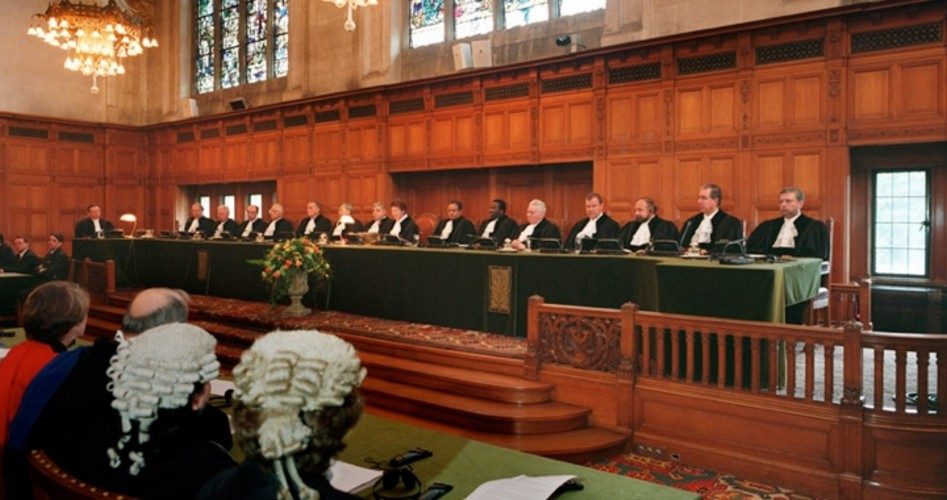
The United Nations’ highest court, the International Court of Justice (ICJ) handed the Islamic Republic of Iran a partial victory against the United States on Wednesday, ruling that America must halt sanctions on certain humanitarian items going into Iran.
Among those “humanitarian” items are airplane parts.
Iran had asked the 15-judge panel for all sanctions to be terminated without delay and for compensation for revenue losses it had incurred after the United States’ May 8 withdrawal from the Iran Nuclear Deal. While the court rejected the compensation request, it did order the United States to “remove by means of its choosing, any impediments arising from the measures of May 8 to the free exportation to the territory of the Islamic Republic of Iran” of medicines and medical devices; foodstuffs and agricultural commodities; and spare parts, equipment, and services necessary for the safety of civil aviation.
The Trump administration levied new sanctions on Iran in August after abandoning the Iran Nuclear deal in May. More punitive measures are expected to be announced in November. Reportedly, the new sanctions may be targeting Iran’s oil and shipping industries and its central bank. European allies have been struggling to keep the deal alive since the United States’ departure.
In court, Iran argued that renewed sanctions violated the 1955 Treaty of Amity, Economic Relations and Consular Rights between the two nations. That treaty gave the ICJ jurisdiction over economic and trade disputes between the two nations.
Lawyers for the United States argued that Iran’s claims fell outside the bounds of that treaty and, therefore, the ICJ had no jurisdiction. They also added that some humanitarian exemptions were already being made
The ICJ had earlier decided that the 1955 treaty was still valid, despite the 1979 Islamic Revolution, which overthrew the U.S.-backed Shah of Iran and ushered in the Islamic government.
The new ruling is “binding,” but the ICJ has no enforcement mechanism. Therefore, led by President Trump, the United States is likely to ignore it.
Both sides claimed victory, with Iranian Foreign Minister Mohammad Javad Zarif calling the ruling “another failure for sanctions-addicted U.S. government and victory for rule of law.”
But U.S. Secretary of State Mike Pompeo had another view: “The court’s ruling today was a defeat for Iran. It rightly rejected all of Iran’s baseless requests…. Given Iran’s history of terrorism, ballistic missile activity and other malign behaviors, Iran’s claims under the treaty are absurd.”
But neither side can properly claim a true victory, as Wednesday’s decision was on so-called provisional measures. The final ruling on the full case may take several years.
The United States also announced that it was abandoning the outdated 1955 treaty on which the court’s ruling was based. “This is a decision, frankly, that is 39 years overdue,” Pompeo said, referencing the 1979 revolution, during which 52 American citizens were held hostage for 444 days by Islamic militants.
In 1980, Iran ignored a ruling by the ICJ to release the 52 Americans.
Pompeo also claimed that the United States possessed “solid” evidence that Iran is responsible for recent attacks against Americans in Iraq. The consulate in the city of Basra was closed last week owing to Iranian-backed violence. Earlier this month, a mortar attack was carried out near the U.S. Embassy in Baghdad, with at least 16 explosions reported near the compound.
“These latest destabilizing acts in Iraq are attempts by the Iranian regime to push back on our efforts to constrain its malign behavior,” Pompeo said. “Clearly, they see our comprehensive pressure campaign as serious and succeeding.”
Regardless of how one feels about the U.S. sanctions on Iran, it’s absurd for the United States to even participate in these so-called trials. Without any enforcement mechanisms, any rulings that the ICJ renders are, at best, good only for propaganda. And, let’s face it, the majority of that propaganda is anti-American.
The United States is responsible for funding 22 percent of the UN’s biennial budget. No other nation even comes close to that. Japan is second at just under 10 pecent, and economic powerhouse China only funds about eight percent of the UN’s budget. Still, the organization has the gall to complain that the United States is in “arrears” to it to the tune of $3 billion.
With its phony International Court of Justice, its useless bureaucracies, and its rampant anti-Americanism, isn’t it long past time that the United States remove itself from the ineffective and corrupt United Nations and use that money for better purposes?
 Photo: public hearing at the UN International Court of Justice
Photo: public hearing at the UN International Court of Justice




